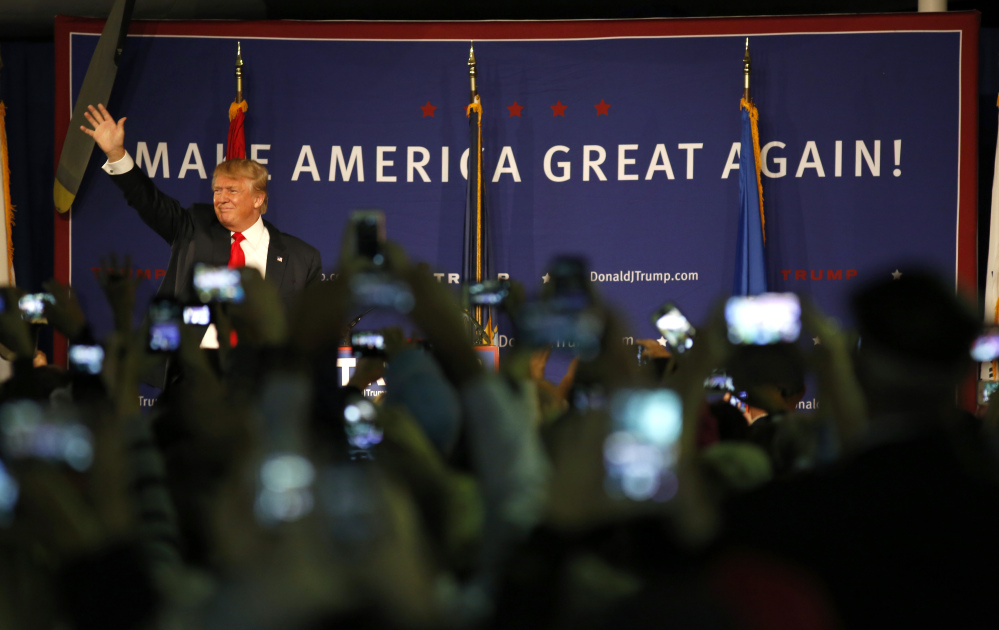MOUNT PLEASANT, S.C. – Donald Trump on Tuesday stood by his call to block all Muslims from entering the United States, even as the idea drew condemnation from rival Republican presidential candidates, party leaders and others as un-American and potentially dangerous.
“I don’t care about them,” Trump told CNN in an early-morning phone interview, when asked about denunciation by GOP leaders. “I’m doing what’s right.”
Trump’s call Monday for a “total and complete shutdown of Muslims entering the United States” has drawn an unusually forceful level of rebuke and condemnation from across the party and abroad.
British Prime Minister David Cameron slammed it as “divisive, unhelpful and quite simply wrong.” Muslims in the United States and around the world denounced it as unconstitutional or offensive. The front page of the Philadelphia Daily News featured a photo of Trump holding his right hand out as if in a Nazi salute with the headline “The New Furor.”
“This is not conservatism,” House Speaker Paul Ryan told reporters after a closed-door GOP caucus meeting in response to Trump’s comments. “What was proposed yesterday is not what this party stands for and more importantly, it’s not what this country stands for.”
But Trump, who appears to revel in controversy, didn’t back down, saying that banning all Muslims “until our country’s representatives can figure out what the hell is going on” is warranted after last month’s attacks by Muslim extremists in Paris and last week’s shooting in San Bernardino, California, that killed 14.
“We are now at war,” said Trump, who further defended his plan by comparing it with President Franklin Roosevelt’s decision to intern Japanese Americans during World War II.
Trump’s proposed ban would apply to immigrants and visitors alike, a sweeping prohibition affecting all adherents of a religion practiced by more than a billion people worldwide. The current Republican poll-leader announced his plan to cheers and applause at a Monday evening rally in South Carolina, where many supporters welcomed the proposal.
Since the Nov. 13 attacks in Paris that killed 130 people and wounded hundreds, a number of Republican presidential contenders have proposed restrictions on refugees and tighter surveillance in the U.S.
But Trump’s proposed ban goes much further, and his Republican rivals were quick to reject the latest provocation from a candidate who has delivered no shortage of them. “Donald Trump is unhinged,” Jeb Bush said via Twitter. “His ‘policy’ proposals are not serious.”
Sen. Lindsey Graham went further, warning that Trump’s rhetoric risked inflaming tensions in the Middle East, echoing concerns that it plays right into the recruiting strategy of Islamic State militants, who have framed their battle as a war between Islam and the West.
“He’s putting our soldiers and diplomats at risk, he’s empowering the enemy,” said Graham, another GOP presidential contender, in an interview with CNN. Trump, he said, is making new enemies of people “who came to our side in Iraq and Afghanistan and who are under siege in their own countries.”
“It basically becomes a death sentence for them,” he added, describing Trump as “ISIL man of the year.”
Trump’s proposal has also drawn criticism from legal experts who challenge its constitutionality and feasibility.
Leti Volpp, a University of California expert on immigration law said “there is no precedent for a religious litmus test for admitting immigrants into the United States.”
“Excluding almost a quarter of the world’s population from setting foot in the United States based solely upon their religious identity would never pass constitutional muster,” Volpp said.
Colvin reported from Newark, New Jersey. Associated Press writers Mark Sherman, Laurie Kellman, Josh Lederman and Alan Fram in Washington and Bill Barrow in South Carolina contributed to this report.
Follow Jill Colvin on Twitter at: http://twitter.com/colvinj
Send questions/comments to the editors.



Comments are no longer available on this story